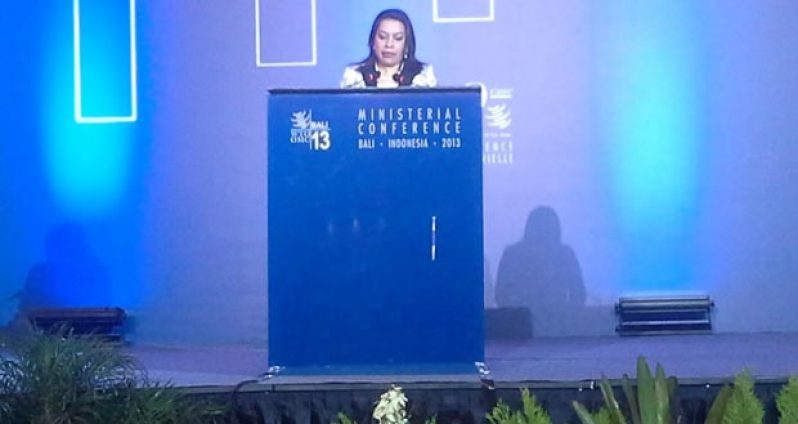FAILURE IS NOT AN OPTION
– registers CARICOM’s support for multi-trading systems
MINISTER of Foreign Affairs Carolyn Rodrigues-Birkett, yesterday addressed the ninth World Trade Organization (WTO) Ministerial Conference in Bali, Indonesia, on behalf of the Caribbean Community (CARICOM), in her capacity as CARICOM Ministerial Spokesperson on WTO Matters.
She registered the Community’s continued support for the multilateral trading system and stressed its importance on the effective functioning of the rules-based multilateral trading system.
“We see this (the effective functioning) as the best guarantee for our successful integration into an increasingly globalised economy. I cannot over-emphasise that it is the small and vulnerable economies that stand to lose the most if success eludes us here in Bali. For us, failure is just not an option. We must succeed in Bali.”
STILL TO BE REALISED
The minister bemoaned the fact that the promise of the Doha Development Agenda (DDA) is still to be realised.
“We had hoped that this would have ushered in a new dispensation of development-oriented solutions to problems faced by economies such as ours in this era of globalisation,” Rodrigues-Birkett said.
Also referred to as the Doha Development Round, it is the current trade-negotiation round of the WTO which commenced in November 2001. Its aim is to achieve major reform of the international trading system through the introduction of lower trade barriers and revised trade rules. The work programme covers about 20 areas of trade. The Round’s fundamental objective is to improve the trading prospects of developing countries. It was officially launched at the WTO’s Fourth Ministerial Conference in Doha, Qatar, in November, 2001. The Doha Ministerial Declaration provided the mandate for the negotiations, including on agriculture, services and an intellectual property topic, which began earlier. In Doha, ministers also approved a decision on how to address the problems developing countries face in implementing the current WTO agreements.
According to the minister, considerable efforts have been made over the past few months by the Director General and members of the WTO to craft a package for adoption by the ninth conference, but lack of consensus in Geneva on the call for the necessary political impetus to allow for the Bali package to be agreed on and adopted is disappointing.
She said, “We believe this is possible.” CARICOM places great importance on the negotiating function of the WTO, which still holds the promise of finding development oriented solutions to a wide range of trade related issues of concern to small and vulnerable members.
“Another failure in the decision-making function of the WTO will lead to a greater loss of confidence in the Multilateral Trading System’s ability to deliver results, beneficial to all and in particular, the most vulnerable.”
CONCERNS
Rodrigues-Birkett also underscored few areas of concern for CARICOM, as delegates look ahead to the post-Bali work programme.
She said, “We must work towards the completion of the Doha Development Agenda with particular emphasis on Special and Differential Treatment for developing and least developed countries. We must ensure, among other things that draft modalities, which provide flexibilities for small, vulnerable economies, particularly in agriculture and NAMA (non-agricultural market access), are preserved and become part of a final outcome.”
The minister also underscored the importance CARICOM placed on the work programme on Small Economies, which, according to her, must be intensified in accordance with the Ministerial Decision to be adopted by this conference.
“The operations of the Dispute Settlement process continue to be of concern. The ongoing reform negotiations must address issues of compliance with rulings, especially those in favour of small economies. A CARICOM member has experienced this first hand and situations like this serve to undermine the credibility of the Dispute Settlement Mechanism. The enhancement of third party rights must also be addressed so that small economies can represent their interests more effectively,” she said.
The ‘Aid for Trade’ was also a concern brought to the fore and Rodrigues-Birkett called on the WTO Secretariat to intensify its advocacy and monitoring role.
She said: “CARICOM launched its regional Aid for Trade Strategy earlier this year and the support of the international community in making this strategy a reality is vital as the Region seeks to integrate into the global economy.
“CARICOM takes note of the growing trend towards plurilateral arrangements in the WTO system and their implications for the effective functioning of the multilateral trading system. This is a trend which requires careful evaluation…CARICOM also calls upon the WTO to support the simplification of the accession process for small and vulnerable economies. These countries should not be called upon to give concessions beyond their levels of development.”
On that note, the Foreign Affairs Minister welcomed the new Director General, Ambassador Roberto Azevedo, and the energy and dynamism he brought to the organisation, coupled with the deep understanding that he has demonstrated for the issues of importance to developing countries, including small, vulnerable economies.
She thanked the government and the people of Indonesia for the “warm hospitality and excellent arrangements” made for this meeting.



.jpg)









